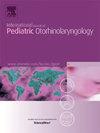Steroid use after pediatric tonsillectomy: A systematic review and meta-analysis
IF 1.3
4区 医学
Q3 OTORHINOLARYNGOLOGY
International journal of pediatric otorhinolaryngology
Pub Date : 2025-10-10
DOI:10.1016/j.ijporl.2025.112584
引用次数: 0
Abstract
Objective
Codeine-containing products for postoperative pain in pediatric adenotonsillectomy were contraindicated in 2013, prompting a search for alternative analgesic methods. This systematic review examines whether postoperative steroids improve clinical outcomes – specifically pain, nausea, vomiting, and postoperative hemorrhage – in pediatric patients following tonsillectomy.
Data sources
Comprehensive literature review (MEDLINE/PubMed, Cochrane Library, Embase) of studies conducted internationally between February 20, 2013, and December 5, 2024.
Methods
A comprehensive literature search of PubMed/MEDLINE, Cochrane Library, and Embase was conducted for studies published between February 20, 2013 and December 5, 2024. Included studies were randomized controlled trials, cohort studies, and observational studies evaluating postoperative steroid use in pediatric tonsillectomy patients with reported outcomes of pain, nausea, vomiting, or hemorrhage. Extracted data included steroid type, dosage, timing, and primary outcomes. A random-effects model was used to calculate pooled risk ratios for postoperative hemorrhage.
Results
Eight studies, reporting on 4598 patients, met inclusion criteria. The studies exhibited heterogeneity in steroid type, dose, and timing. Pain outcomes varied, with three of five studies reporting significant reductions at specific postoperative time points. Pooled analysis of postoperative hemorrhage rates revealed no significant reduction (RR 0.88, 95 % CI 0.55–1.41, p = 0.60). Three studies evaluated nausea and vomiting; one reported significant reduction, while the other two showed no difference.
Conclusions
While postoperative steroids may reduce pain and possibly alleviate nausea and vomiting after pediatric tonsillectomy, current evidence is limited and inconsistent due to study heterogeneity. Steroids do not appear to significantly affect postoperative hemorrhage rates. Further research is needed to clarify their role in recovery.
儿童扁桃体切除术后类固醇的使用:一项系统回顾和荟萃分析。
目的:2013年儿童腺扁桃体切除术术后疼痛禁用含可待因产品,促使人们寻找替代镇痛方法。本系统综述探讨了扁桃体切除术后儿科患者术后类固醇是否能改善临床结果,特别是疼痛、恶心、呕吐和术后出血。数据来源:综合文献综述(MEDLINE/PubMed, Cochrane Library, Embase) 2013年2月20日至2024年12月5日在国际上进行的研究。方法:对2013年2月20日至2024年12月5日发表的研究进行PubMed/MEDLINE、Cochrane Library和Embase的综合文献检索。纳入的研究包括随机对照试验、队列研究和观察性研究,评估儿童扁桃体切除术患者术后类固醇使用情况,报告的结果为疼痛、恶心、呕吐或出血。提取的数据包括类固醇类型、剂量、时间和主要结局。采用随机效应模型计算术后出血的合并风险比。结果:8项研究报告了4598例患者,符合纳入标准。这些研究显示了类固醇类型、剂量和时间的异质性。疼痛结果各不相同,五项研究中有三项报告在特定的术后时间点有明显的减轻。合并分析显示术后出血率无显著降低(RR 0.88, 95% CI 0.55-1.41, p = 0.60)。三项研究评估恶心和呕吐;其中一个报告了显著的减少,而另外两个没有显示差异。结论:虽然术后类固醇可以减轻儿童扁桃体切除术后的疼痛并可能减轻恶心和呕吐,但由于研究的异质性,目前的证据有限且不一致。类固醇似乎对术后出血率没有显著影响。需要进一步的研究来阐明它们在恢复中的作用。
本文章由计算机程序翻译,如有差异,请以英文原文为准。
求助全文
约1分钟内获得全文
求助全文
来源期刊
CiteScore
3.20
自引率
6.70%
发文量
276
审稿时长
62 days
期刊介绍:
The purpose of the International Journal of Pediatric Otorhinolaryngology is to concentrate and disseminate information concerning prevention, cure and care of otorhinolaryngological disorders in infants and children due to developmental, degenerative, infectious, neoplastic, traumatic, social, psychiatric and economic causes. The Journal provides a medium for clinical and basic contributions in all of the areas of pediatric otorhinolaryngology. This includes medical and surgical otology, bronchoesophagology, laryngology, rhinology, diseases of the head and neck, and disorders of communication, including voice, speech and language disorders.

 求助内容:
求助内容: 应助结果提醒方式:
应助结果提醒方式:


